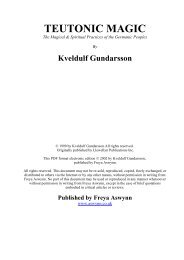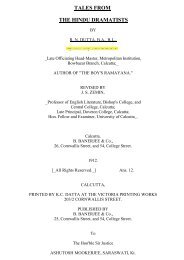Untitled - Awaken Video
Untitled - Awaken Video
Untitled - Awaken Video
Create successful ePaper yourself
Turn your PDF publications into a flip-book with our unique Google optimized e-Paper software.
Appendix A. The Ásatrú-Folk Manifesto 238<br />
center of its own realm, completely sovereign and independent of any organization.<br />
Crossing into the householdings of another automatically means that the<br />
rules of conduct of that household supersede all others. If an individual cannot,<br />
for some reason, abide by the rules of conduct in the household of another, he is<br />
obligated to leave.<br />
The exception to the above is that household members visiting another household<br />
as a group are expected to adhere to the rules of conduct of their own, household<br />
as well as those of the host (usually enforced by an elder) as in the case of one<br />
family visiting another. If the rules of the 2 households conflict, the visiting<br />
family is obligated to leave. Guests causing strife in a host’s household is to be<br />
avoided. <br />
4. We recognize that each human being is either the head or a member of a household<br />
and as a representative of a household is worthy of respect.<br />
Commentary: We accept that each individual human being regardless of his or<br />
her background, religious or political affiliation, or personal philosophy/ practices<br />
retains the right to run or participate in a household of his or her choosing and<br />
regardless of whether we agree with their personal/ household philosophy. The<br />
member of any one household may set guidelines, rules, etc. for the household of<br />
which he or she is a member and is respected in that right, but no one household<br />
holds dominion over another.<br />
5. The Frið-yard is considered either a temporary or permanent household. If the<br />
Frið-yard is on the property of an Ásatrú household, the rules of conduct of the<br />
host’s household apply; if the Frið-yard is on public lands or lands obtained for<br />
the purpose of celebration, the guests may either determine the rules of conduct<br />
among themselves or the procurer of the temporary site may set the rules of<br />
conduct prior. In either case, the temporary rules of conduct are added to any<br />
existing rules, laws or regulations which are part and parcel to the land itself<br />
and do not supersede them.<br />
Commentary: Ásatrú Folk enjoy ‘moots’ as they are called in common Ásatrú<br />
parlance and will join them up to several times per year. There must be common<br />
agreements to the rules of conduct which may be set by the hosting household (as<br />
is often the case even if it is on public lands) or by a committee of elders prior<br />
to the date of the feast. All members must agree on the terms of conduct and<br />
on the set fines for infractions. Banishment (outlawry) is the commonest fine<br />
although monetary fines may also be imposed. In any case, the rules of conduct<br />
must be known to all partakers prior to or at the beginning of the event.<br />
In the case of events occurring on public lands, rules, regulations, and laws regarding<br />
the use of alcohol, drugs, nudity, minor participants, and fires (or any<br />
other area of concern) must be taken into account.
















